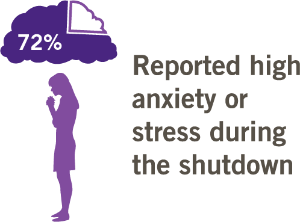WSU Completes Study of Government Shutdown Impact on Northern Utah
OGDEN, Utah –Weber State University’s Center for Community Engaged Learning-Research Extension (CCEL-RE) has concluded its surveys to measure the impact of the recent partial federal government shutdown on the Northern Utah economy. The 35-day shutdown most notably resulted in increased financial insecurity for federal employees, and increased anxiety and stress.
 The surveys help to support many of the suspicions researchers had about the shutdown’s impact on the economy and the stress, anxiety and financial uncertainty faced by furloughed employees.
The surveys help to support many of the suspicions researchers had about the shutdown’s impact on the economy and the stress, anxiety and financial uncertainty faced by furloughed employees.
The surveys measured the shutdown’s effect on federal government employees, local businesses and nonprofit organizations. Between the Internal Revenue Service, the Forest Service and other government entities, more than 5,000 federal government employees work in Weber County.
“As an economic development leader in the region, it is important for Weber State to understand and identify the community impact of major events such as the recent government shutdown,” said Guy Letendre, WSU economic development director. “Partnering with Ogden City, Weber County, Davis County and the Division of Workforce Services provided more robust and comprehensive results. The next steps will be to use information gleaned from the research to innovate solutions for identified financial gaps and create resources in case of future workforce disruption.” ![]()
 Findings indicated that 36% of surveyed federal government employees received help from charities, friends or family. Thirty percent went to a food pantry or received a free meal from a local restaurant.
Findings indicated that 36% of surveyed federal government employees received help from charities, friends or family. Thirty percent went to a food pantry or received a free meal from a local restaurant.
“I just wish that congress would realize that shutting the government down affects a lot of people,” one respondent said. “All we want to do is go to work, do our job and get paid like everyone else.”
Of those who took out loans or used credit cards to help make ends meet, 71% said they would need three or more months to repay the debts. Sixty percent applied to skip or defer payment for a credit card, mortgage or loan during the shutdown and 35% missed a rent or mortgage payment.
Following the shutdown, 65% show they are very or somewhat concerned about finances. Forty-six percent report that morale at work is low, and 42% intend to retire early or make a career change.
Mental well-being of government employees was also affected, with 72% of respondents reporting a high level of anxiety or stress during the shutdown. Less than 4% reported receiving help for their mental health.
Most nonprofits surveyed reported seeing either the same demand or little increase in demand for their services during the shutdown. Despite this small change in demand, 50% reported that the shutdown impacted their ability to provide services. Of nonprofits who rely on federal funding, 44% stated that the interruption of federal support impacted provision of services.
 “We decreased services for clients and stopped all non-emergency funding, reduced the number of clients able to access the emergency shelter and prepared for a reduction in staff,” one nonprofit responded.
“We decreased services for clients and stopped all non-emergency funding, reduced the number of clients able to access the emergency shelter and prepared for a reduction in staff,” one nonprofit responded.
Fifty-seven percent of surveyed businesses saw a revenue decrease, with 14% experiencing a decrease of more than 30%. However, 78% of businesses do not expect enduring effects from the shutdown.
Questions remain regarding the underlying causes of financial insecurity and why few employees were able to receive mental health support.
“The surveys raised a lot of interesting questions that we would like to explore by conducting focus groups this fall,” said Katharine French-Fuller, CCEL-RE director. “This will include questions like why furloughed employees had such low rates of savings, how employees working without pay can receive services and how our community can meet the mental health needs of those affected.”
CCEL-RE intends to re-survey should another shutdown occur in the future.
To view a full copy of the report, visit weber.edu/ccel/research.
About CCEL-RE
The mission of CCEL-RE is to meet the data and research needs of community partners and nonprofits in Ogden and Greater Northern Utah. The RE undertakes community research projects that are for any length of time, are faculty or staff led, with support from an undergraduate research assistant.
For the entire suite of graphics, visit the following links:
Visit weber.edu/wsutoday for more news about Weber State University.
Ross Rosier, Office of Marketing & Communications
801-626-7948 • rossrosier@weber.edu- Contact:
Guy Letendre, WSU Economic Development director
801-626-6569 • guyletendre@weber.eduKatharine French-Fuller, CCEL-RE director
801-626-7631 • kfrenchfuller@weber.edu